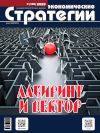Time of Troubles and Management Science. New Twists in History
DOI: 10.33917/es-2.188.2023.80-89
The basic reasons for the onset of the Time of Troubles in Russia, associated with inability of the central government to perform their functions, are identified. An important role in instability was played by external organizations, including those that demonstrated a “friendly” attitude towards Russia. Withdrawal of the Fatherland from the Time of Troubles’ instability is connected with the emergence of organizations within it that are capable of realizing the idea of the country’s selfpreservation. The author concludes that the Time of Troubles in Russia came when the three main forces of organizations — owners, managers and the staff (in this case, the “orphan people”) lost their value orientations and did not act as a common front against the interventionists.
References:
1. Volkov V.A., Kuz’min A.G. Smutnoe vremya [Time of Troubles]. Moscow, Algoritm, 2012.
2. Gaidar E. Smuty i instituty [Troubles and Institutions]. Moscow, Algoritm, 2015.
3. Denisov A.V. Smutnoe vremya. Vzglyad inzhenera [Time of Troubles. Engineer’s Perspective]. Moscow, Izd-vo Vorob’ev A.V., 2012.
4. Zinov’ev A. A. Russkaya smuta [Russian Turmoil]. Moscow, Kelvori, 1995.
5. Kurganov A.B. Lyudi Smutnogo vremeni. Istoricheskoe issledovanie [People of the Time of Troubles. Historical Research]. Moscow, AST, 2008.
6. Morozova L.E. Istoriya Rossii. Smutnoe vremya. Pravda i vymysel, svidetel’stva sovremennikov [Russian History. Time of Troubles. Truth and Fiction, Testimonials of Contemporaries]. Moscow, AST, 2011.
7. Pechenev V.A. “Smutnoe vremya” v noveishei istorii (1985–2003). Istoricheskie svidetel’stva i razmyshleniya uchastnika sobytii [“Time of Troubles” in Recent History (1985–2003). Historical Evidence and Reflections of the Events Participant]. Moscow, Norma, 2004.
8. Platonov S.F. Smutnoe vremya. Ocherk istorii vnutrennego krizisa i obshchestvennoi bor’by v Moskovskom gosudarstve XVI i XVII vv. [Time of Troubles. History Essay on the Internal Crisis and Social Struggle in the Moscow State of the XVI and XVII Centuries]. Moscow, AIRO-XXI, 2007; Smutnye vremena nachala XVII–XX stoletii i opyt ikh preodoleniya v istoricheskoi sud’be Rossii: Sb. materialov po itogam Vserossiiskoi nauchno-prakticheskoi konferentsii s mezhdunarodnym uchastiem. Vladimir, 2–3 noyabrya 2020 g. [Troubled Times at the Beginning of the 17th–20th Centuries and the Experience of Overcoming Them in the Historical Fate of Russia: Collected Materials on the Results of the All-Russian Scientific and Practical Conference with international Participation. Vladimir, November 2–3, 2020]. Vladimir, Tranzit-IKS, 2020.
9. Dvornichenko A.Yu. Smuta kak faktor rossiiskoi istorii [Time of Troubles as a Factor in Russian History]. Vestnik Sankt-Peterburgskogo un-ta. Istoriya, 2018, vol. 63, vyp. 3, pp. 679, 682–684.
10. Marchenya P.P., Razin S.Yu. “Smutovedenie” kak “gordiev uzel” rossievedeniya: ot imperii k smute, ot smuty k…? [“Study of Troubles” as a “Gordian Knot” of Russian Studies: From Empire to Troubles, from Troubles to…?]. Rossiya i sovremennyi mir, 2010, no 4, pp. 50.


